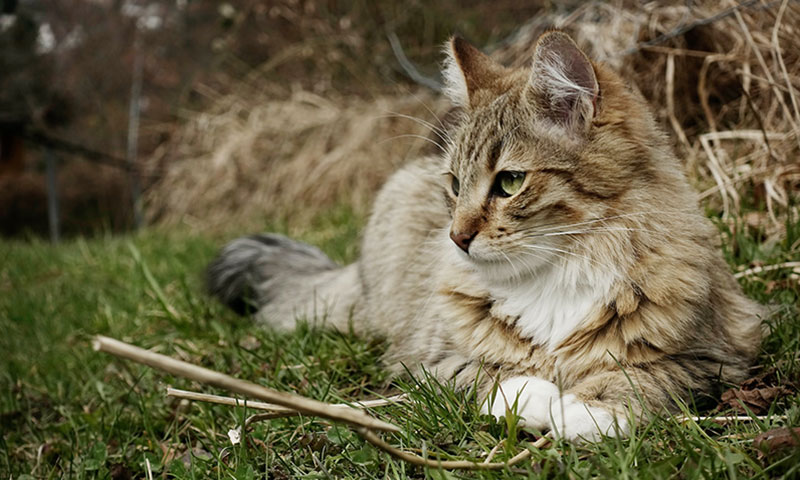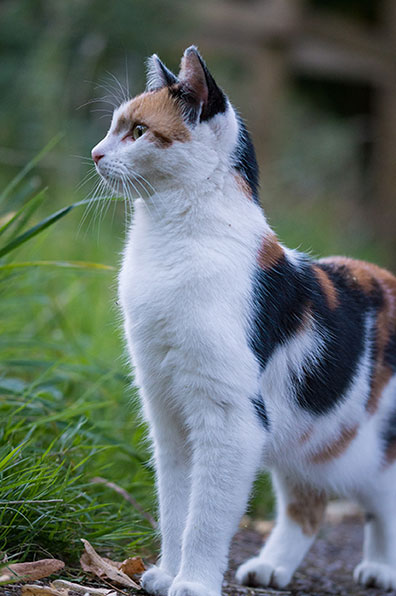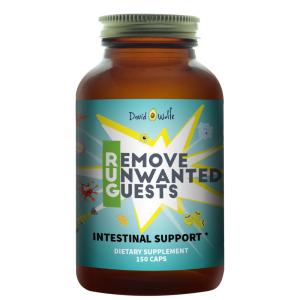Does your cat have parasites, too? Cat parasites are just as common as those found on and in dogs. The better question for cat owners, then, is do you have parasites, too?
Unfortunately, parasites don’t really care about which mammals they inhabit – as long as they find a cozy place to call home. And that “cozy place” could be your cat’s skin, stomach, or colon, to name a few.
But the most concerning cat parasite for humans may be Toxoplasma gondii, or T. gondii. When a person get sick from this cat parasite, the resulting illness is called Toxoplasmosis.
What is the Cat Parasite T. gondii?
T. gondii is a single-cell organism that prefers cats over other mammals, yet it is one of the most “successful” parasites in the world. That’s thanks to its complex lifecycle. (1)
This cat parasite can find a home in either a “definitive” host — that’s your cat! — or an “intermediate” host — that’s you! That’s also every other mammal, by the way, and that’s part of the reason T. gondii is so common worldwide. Basically, it can reproduce in domestic and wild cats. The eggs come out in cat feces, which helps the parasite to spread. (2)
In intermediate hosts, like humans, dogs, mice, cows, the parasite with clone itself and create cysts that penetrate muscle tissue and other soft tissue. If anyone eats undercooked meat with one of these cysts, then – BOOM – that person can become infected. (3)
Imagine a cat eating an infected mouse. Or you eating infected beef.
Of course, T. gondii also spreads from cats via the litterbox or sand box or other contamination from cat feces.
Then you have this parasite cloning in your body, creating cysts to help it spread.
You may wonder, though, if that’s the parasite, what is the disease?

What is Toxoplasmosis?
T. gondii infection causes toxoplasmosis, an infectious disease that exists worldwide. Where there are cats, there is likely toxoplasmosis infection.
Most healthy adults have no problem with this infection. People with compromised or weak immune systems, however, may not be able to suppress this parasite. Think about the elderly, pregnant women and babies, as well as people with suppressed immune systems. When they get infected with T. gondii, severe illness can set in. (4)
This parasite is particularly dangerous for unborn babies.
But here’s the big takeaway:
Being infected with the parasite does not mean that you will have the disease. In fact, this infection is normally harmless to individuals with an effective immune response. So strengthening the immune system helps you fight toxoplasmosis and other cat parasites. (5)
Other Cat Parasites
As mentioned, cats can host just about any of the common parasites, including tapeworm, roundworm, and hookworm. Yikes! So if you have a cat you love on often – especially if that cat is allowed to roam outdoors – then you should consider a parasite cleanse. (6)
Parasites are often called “unwanted guests.” You can guess why.
Whether it’s T. gondii or something else, you want to support your immune system to prevent any disease caused by parasites. That means making your body inhospitable to them.
The problem, of course, is that the very goal of these critters is to live in you without causing problems. After all, if parasites made you sick, you’d do something about it. Their goal is to sail under the radar. In other words, you may have some kind of parasite in you right now and not even know.
That’s why we recommend a routine parasite cleanse. And Remove Unwanted Guests (RUG) is a natural alternative to some of the parasite medications on the market.
Solutions for Toxoplasmosis
We know that T. gondii is very common worldwide. Many people have already gotten infected, and their immune systems have already suppressed the parasite.
But what if you fall into the high risk category?
Toxoplasmosis causes flu-like illness, as well as eye pain and even blindness in some cases. The most serious illness affect the pregnant mothers and their unborn babies. The mother may have a miscarriage or still birth, or the baby may develop serious problems later in life. (7)
The two most common drugs for toxoplasmosis are pyrimethamine and sulfadiazine. They work together to kill the parasite and prevent reproduction. Well, not kill completely. In fact, these drugs do not fully destroy the parasite in all its stages. (8)
On top of that, sulfadiazine (9) and pyrimethamine (10) have a full complement of side effects. (11)
Unfortunately, the CDC notes that “the parasite is not eliminated completely” (12) and infants may need to be treated with these drugs for 1-2 years. (13) “Therefore, a newer and safer therapy for toxoplasmosis is an urgent need.” (14)
RUG offers natural support from cat parasites!
The proprietary blend of herbs in RUG helps support the body and make the body inhabitable to any cat parasite, including T. gondii. In fact, a meta-study published in the Canadian Journal of Physiology and Pharmacology (2016), analyzed 61 plants for their impact on T. gondii specifically. (15)
Several herbs came out on top, including from the Artemisia family and walnut hulls. RUG uses an effective combination of cloves, wormwood, and black walnut hull. “This combination is considered especially effective against a wide range of human parasites and intestinal worms.” (16)
1. Cloves (Syzygium aromaticum)
Cloves, a common spice, are believed by some to have potential anti-parasitic and antiviral properties. They contain eugenol, a compound with antimicrobial and anti-inflammatory properties that may help combat parasites. Again, it’s about making your body a poor home for parasites. While it’s always a good idea to check with a veterinarian, cloves are not toxic to cats and can help them just like they help you. (17, 18)
2. Wormwood (Artemisia absinthium)
What is wormwood? The name says it clearly. Wormwood, from the Artemisia family of plants, combats T. gondii. People have used this well-known herb for centuries to treat various ailments, including parasitic infections. Artemisia annua is the variety studied most extensively. But we use Artemisia absinthium, a very similar variety found widely in temperate regions, including North America. The main active compound, artemisinin, destroys parasitic cells. It also contains compounds like thujone, which have anti-parasitic properties. We’re talking about use in humans here, as excessive use in pets can be toxic. (19, 20)
3. Black Walnut (Juglans nigra)
Black walnut hulls have been used in natural medicine for their potential anti-parasitic properties — specifically, the green hull of black walnuts found in North America. The study cited here uses a Manchurian walnut variety, but the active compounds are similar. Black walnut hulls contain compounds like juglone, which may help combat T. gondii. It’s important to note that cats are obligate carnivores, meaning their digestive system is not designed for plant foods. Walnuts aren’t toxic per se, but walnuts can give cats gastric upset. (21, 22)
Begin Here
Assume for the moment that you do have parasites. You may think you are immune in today’s society, but parasites live in cities and suburbs, too.
If you have cats, you may be sharing more than love. You may be sharing cat parasites. RUG is here to help expel any unwanted guests and protect your body from toxoplasmosis. You can get yours here: Remove Unwanted Guests.
The CDC’s Fact Sheet on Toxoplasmosis for Pregnant Moms offers a pretty comprehensive list with strategies to avoid this and other cat parasites altogether. Building a robust immune system and limiting risk are excellent strategies to avoid infection. (23)
Please Note: As mentioned, cats are obligate carnivores. They can’t properly digest plant foods as effectively as humans. Discuss using any natural parasite remedy with your veterinarian before use.




